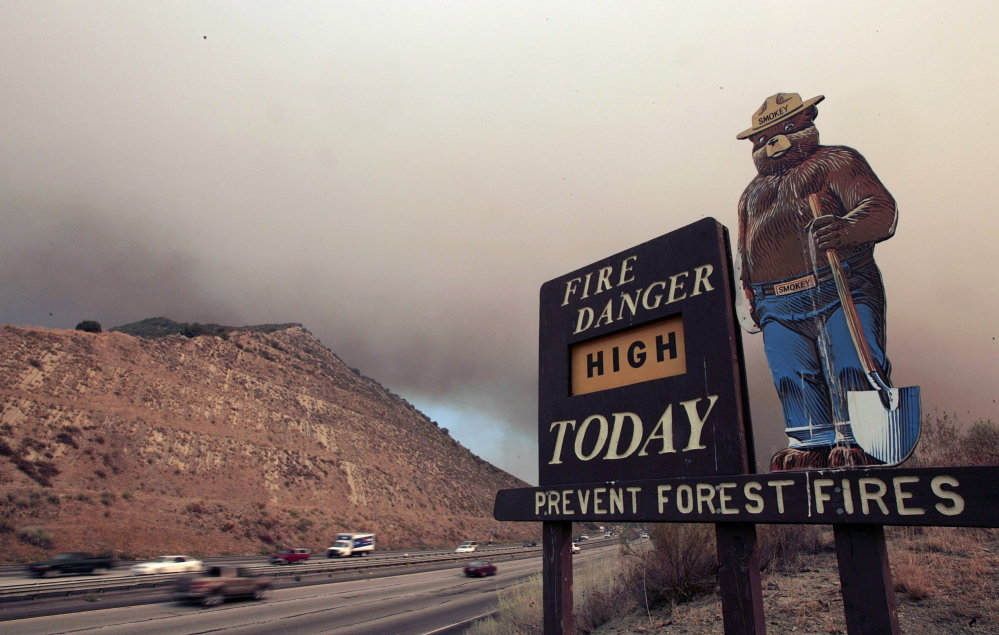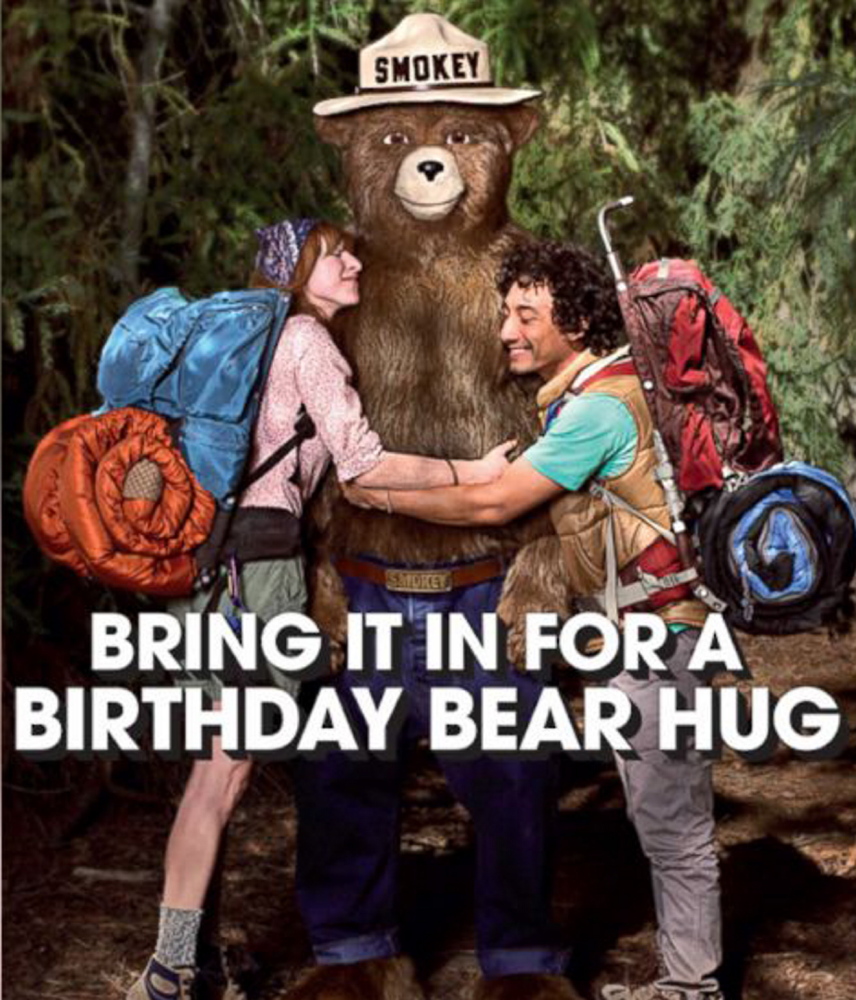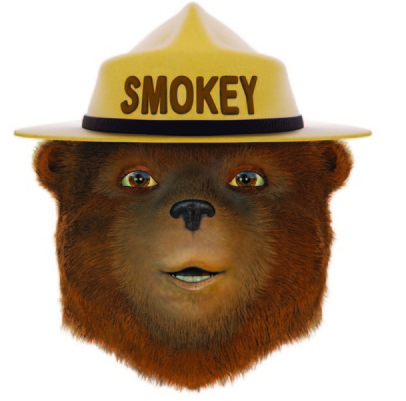LOS ANGELES — Smokey Bear turns 70 this summer. But instead of kicking back in retirement – whacking golf balls or sniffing around for early-bird dinner specials – the bear in bluejeans is returning to work to educate people about wildfires.
Last year, there were 47,579 wildfires nationwide, according to the federal government. Typically, nine out of 10 are caused by humans. Fire danger is expected to be high this summer, particularly in the parched Western states.
So, with the help of advertising agencies, Smokey Bear has been enlisted for a new marketing campaign to remind humans to be more careful.
Handlers of the iconic animal have decided he needed a younger and fresher look. They want him to fit in with the millennial generation of teenagers and young adults.
Smokey Bear now has a Facebook page as well as Instagram and Twitter accounts. He has 22,000 followers on Twitter. His social media profile got a boost in February when musician Pharrell Williams showed up at the Grammys award show wearing a brown felt hat that people joked looked like Smokey Bear’s ranger hat.
“The nice thing about Smokey is that he has evolved,” said Loren Walker, acting national fire prevention coordinator at the U.S. Forest Service, and Smokey Bear’s primary caretaker.
The bear was created Aug. 9, 1944, as a property of the U.S. government. During World War II, government officials were worried that enemies might set fire to U.S. forests to destroy an important natural resource: wood. More than 22 million acres of U.S. forest burned each year at a time when the government sorely needed the timber.
To help Uncle Sam with its messaging in the war effort, a group of ad executives formed the nonprofit volunteer group the Ad Council. They helped generate posters and slogans for the government, including the famous “Loose Lips Sink Ships.”
Another of the Ad Council’s first projects was to create a campaign to encourage people to be more vigilant in the protection of forests.
The group flirted with using a bird or a horse – but it settled on a bear, Walker said.
“And Smokey Bear is a nice, friendly bear, and that has enhanced his appeal,” Walker said.
A 1952 anthem celebrated “Smokey the Bear” and stirred a debate that lasted several decades. To maintain the proper rhythm in the song, the writers added “the” to the name, etching Smokey the Bear into the public psyche. But his name always was, and still is, Smokey Bear.
Venerable Chicago ad agency Foote, Cone & Belding has represented Smokey Bear on a pro bono basis since he was a cub. As a public service, executives in the agency’s Los Angeles office now volunteer their time to produce ads featuring the bear.
For the new campaign, which rolls out this month, they incorporated suggestions from Brigham Young University students who came up with the concept of Smokey Bear being horrified when presented with a birthday cake topped with 70 flaming candles.
“That would be Smokey’s worst nightmare,” said Eric Springer, chief creative officer of FCB West in Venice.
About 6.7 million acres of forests are lost to fire each year – a fraction of the amount during the 1940s when the campaign began.
“It’s an incredible story,” said Peggy Conlon, chief executive of the Ad Council. “FCB has been nurturing this icon for 70 years, and Smokey Bear continues to be relevant to people’s lives.”
The Ad Council oversees the campaign by providing research and securing free time on TV and radio as well as space in print and digital media for the public service announcements. Over the years, media companies have provided the equivalent of $1.4 billion in donated air time and print space that features Smokey Bear, Conlon said.
The character has endured because it delivers on major tenets of memorable advertising, including relevance, connectivity and emotion, said Howie Cohen, a veteran advertising executive.
“With Smokey, you can feel the humanity and the vulnerability of the character,” said Cohen, chief creative officer of the Phelps Group in Santa Monica. “He is the expert on fire safety, but he lives in the forest so you want to protect him and all his little furry friends. … That’s anthropomorphism at its finest.”
But the advertising executives working on the latest campaign wrestled with challenges.
Federal law places tight restrictions on how Smokey Bear can be used and what he can say. He is allowed to utter just one line: “Only you can prevent wildfires.”
For 54 years, Smokey said: “Only you can prevent forest fires.” The line was modified in 2001 to recognize the danger near more urban areas to “Only you can prevent wildfires.”
Another hitch was that while Smokey Bear is a star among the over-40 crowd, neither he nor his message was as recognized by younger people who grew up in a world teeming with cartoon characters such as the Rugrats and SpongeBob SquarePants.
In fact, the bear’s Q Score – which the advertising industry uses as a measure of a brand’s likability and awareness among consumers – is something of a mystery.
“We haven’t measured him in quite a while – since 1996,” said Henry Schafer, executive vice president of Q Scores Co. “It appeared to us that the character had just dropped out of sight.”
In the 1990s, the bear was quite popular, Schafer said. More than 90 percent of people surveyed had heard of him, and his Q Score was higher than that of most celebrities.
“But people born after 1996 might not know who Smokey Bear is,” Schafer said.
Walker, of the Forest Service, acknowledged the generation gap.
“Smokey is much more recognized by adults, but little children love him too,” Walker said. “At state fairs, I’ve never seen children cower and run away from Smokey Bear like they do Santa Claus.”
To make Smokey relevant again, advertising executives gave him a social media makeover. His digital media is managed by HelpsGood, a marketing agency in Los Angeles that creates social campaigns.
Smokey Bear also took on a softer image. He doesn’t growl as much, and now he gives out bearhugs.
“The bearhug campaign is refreshing the brand, and making him seem more lovable – and more relevant,” FCB’s Springer said. “We didn’t want him to be mad at mankind for starting forest fires.”
Send questions/comments to the editors.





Success. Please wait for the page to reload. If the page does not reload within 5 seconds, please refresh the page.
Enter your email and password to access comments.
Hi, to comment on stories you must . This profile is in addition to your subscription and website login.
Already have a commenting profile? .
Invalid username/password.
Please check your email to confirm and complete your registration.
Only subscribers are eligible to post comments. Please subscribe or login first for digital access. Here’s why.
Use the form below to reset your password. When you've submitted your account email, we will send an email with a reset code.